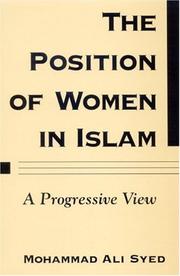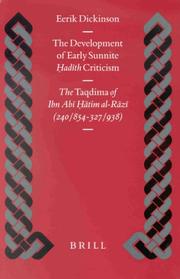| Listing 1 - 3 of 3 |
Sort by
|

ISBN: 0791485048 1423739868 9781423739869 9780791460955 0791460959 9780791460962 0791460967 9780791485040 Year: 2004 Publisher: Albany State University of New York Press
Abstract | Keywords | Export | Availability | Bookmark
 Loading...
Loading...Choose an application
- Reference Manager
- EndNote
- RefWorks (Direct export to RefWorks)
"Challenging the conservative framers of Islamic law who accorded a lesser status to women, Mohammad Ali Syed argues that the Quran and the Hadith - the two primary sources of Islamic law - actually place Muslim women on the same level as Muslim men. Syed provides an overview of both sources and explores their respective roles in Islamic law, emphasizing the Quran's role as the supreme authority and questioning the authenticity of some of the alleged sayings of the Prophet Muhammad (pbuh). From these texts, he elaborates women's rights in a variety of areas, including treatment by God; marriage, divorce, financial provisions, and custody of children; coming out of seclusion (purdah), and taking part in social, economic, legal, and political activities. Rather than presenting what is practiced today, the book covers the theoretical position of Muslim women as sanctioned by the Quran and the authentic Hadith and offers a glimpse of the exalted position of honor and dignity enjoyed by Muslim women in the early days of Islam." "This well-researched book is made more distinctive by the author's personal experience. Raised in Bengal, India, Syed was inspired by his family, who valued men and women equally. As he grew up, Syed realized that most Muslim women lived very differently than the women of his family. According to the author, his family was egalitarian because his father and male relatives were not only devout Muslims but also very knowledgeable about Islam. This book is a culmination of his lifelong concern for women's right under Islam."--Jacket
Women's rights --- Women in the Hadith. --- Women in Islam. --- Hadith --- Women in Islam --- Islam --- Religious aspects --- Islam.
Book
ISBN: 9789004269354 9004269355 9789004294448 9004294449 Year: 2015 Volume: 117 Publisher: Leiden Boston
Abstract | Keywords | Export | Availability | Bookmark
 Loading...
Loading...Choose an application
- Reference Manager
- EndNote
- RefWorks (Direct export to RefWorks)
A number of classical Sunnī Quran commentaries quote several different types of exegetical materials attributed to a few female figures from the first century A.H/seventh century C.E.—āthār, ḥadīths, legal opinions and variant readings, as well as lines of poetry. In Gender and Muslim Constructions of Exegetical Authority , Aisha Geissinger provides a comprehensive introduction to such quotations, and offers an analysis of their place and significance within the pre-modern genre of Quran commentary, demonstrating that key hermeneutical concepts in classical quranic exegesis ( tafsīr ) are gendered. Bringing together materials which have not previously been examined in detail and utilising gender as a lens through which to study them, this work provides a new approach to the study of pre-modern tafsīr .
Women transmitters of the Hadith. --- Hadith --- 297.181 --- Authorities of the Hadith --- Ḥāfiẓ (Hadith) --- Ḥuffāẓ (Hadith) --- Transmitters of Hadith --- Authorities. --- Islam: canonieke boeken; Koran --- Transmitters --- Authorities --- Qurʾan --- Criticism, interpretation, etc. --- 297.181 Islam: canonieke boeken; Koran --- Qurʼan --- Al-Coran --- Al-Qur'an --- Alcorà --- Alcoran --- Alcorano --- Alcoranus --- Alcorão --- Alkoran --- Coran --- Curān --- Gulan jing --- Karan --- Koran --- Koranen --- Korani --- Koranio --- Korano --- Ku-lan ching --- Ḳurʼān --- Kurāna --- Kurani --- Kuru'an --- Qorān --- Quräan --- Qurʼān al-karīm --- Qurʺon --- Xuraan --- Κοράνιο --- Каран --- Коран --- קוראן --- قرآن --- Early works to 1800 --- Qurʼan. --- Qur'an --- Women transmitters of the Hadith --- Hadith - Authorities.

ISBN: 9004118055 9004453245 9789004118058 9789004453241 Year: 2001 Volume: 38 Publisher: Leiden : E.J. Brill,
Abstract | Keywords | Export | Availability | Bookmark
 Loading...
Loading...Choose an application
- Reference Manager
- EndNote
- RefWorks (Direct export to RefWorks)
ḥadīth are the documents recording the words and actions of the Prophet Muḥammad. Originally an enormous and amorphous corpus, Muslim scholars of the third/ninth century separated the ḥadīth they regarded as true from those they held to be forgeries, producing collection of ḥadīth which still command the respect of Muslims today. Ibn Abī ḥātim al-Rāzī (240/854-327/938) was one of the most prominent exponents and practitioners of ḥadīth criticism. He left a copious written legacy, including his famous Taqdima , a biographical dictionary of the early ḥadīth critics. The Taqdima reveals Ibn Abī ḥātims's vision of the critic and gives insight into the mechanism of ḥadīth criticism. It also provides a platform for the examination of the basic intellectual orientation of the ḥadīth critics and their conflicts with their opponents.
Hadith --- Authorities --- Criticism, interpretation, etc. --- History --- Autorités --- Critique, interprétation, etc. --- Histoire --- Ibn Abi óHaatim, 'Abd al-Raóhmaan ibn Muóhammad, --- -Hadith --- -Tradition (Islam) --- Islamic law --- Islamic literature --- Sunna --- Criticism, interpretation, etc --- -History --- Ibn Abi Hatim, 'Abd al-Rahman ibn Muhammad --- Authorities. --- History. --- Ibn Abī Ḥātim, ʻAbd al-Raḥmān ibn Muḥammad, --- -Authorities --- Autorités --- Critique, interprétation, etc. --- Ibn Abī óHaatim, ʻAbd al-Raóhmaan ibn Muóhammad, --- Authorities of the Hadith --- Ḥāfiẓ (Hadith) --- Ḥuffāẓ (Hadith) --- Transmitters of Hadith --- Hermeneutics --- Transmitters --- Ibn Abī Ḥātim, ʻAbd al-Raḥmān ibn Muḥammad, --- Text criticism
| Listing 1 - 3 of 3 |
Sort by
|

 Search
Search Feedback
Feedback About
About Help
Help News
News